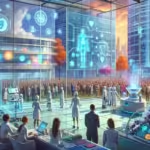The Dawn of AI in Everyday Professions
In a world increasingly shaped by technology, the visionaries of our time continue to predict a future where artificial intelligence (AI) takes center stage. One such visionary, Bill Gates, recently shared his insights on how AI could transform two cornerstone professions: healthcare and education. According to Gates, AI could be on the brink of replacing doctors and teachers within the next decade. This assertion invites many questions and discussions about the trajectory of AI and its impact on these fundamental sectors.
Transforming Healthcare with AI
The potential for AI to revolutionize healthcare is vast. From diagnostics to patient care, AI technologies are already being integrated into medical practices, albeit gradually. Gates suggests a future where AI not only assists but also takes the reins in medical environments, promising significant advancements in healthcare delivery.
The Role of AI in Diagnostics
AI’s ability to analyze extensive data and recognize patterns allows it to excel in areas like diagnostics. Current data-driven approaches have already demonstrated:
With continued advancements, AI could play an essential role in identifying diseases early, improving patient outcomes, and reducing healthcare costs.
Patient Care and AI
AI’s potential impact on patient care could be transformative:
However, Gates acknowledges that the human touch remains crucial, particularly in patient interactions and decision-making processes. The future may see a collaboration between AI and human healthcare providers, enhancing rather than replacing the care given by doctors.
AI in Education: A New Era of Learning
Education is another sector on the cusp of an AI-driven transformation. Gates predicts that AI could redefine the roles of teachers, offering new methods of learning that can cater to individual student needs more effectively.
AI-Powered Personalized Learning
A significant benefit AI brings to education is in its ability to personalize learning, offering:
This personalized approach ensures that students receive a tailored education, potentially improving academic outcomes and interest in lifelong learning.
Teacher’s Role in the Age of AI
While AI can automate many aspects of teaching, it also allows teachers to focus on what they do best:
Gates envisions AI as a tool that empowers teachers, enabling them to enhance their pedagogical methods and focus on nurturing students.
Overcoming Challenges and Ethical Considerations
While the potential benefits of AI in these sectors are immense, several challenges must be addressed before these predictions can become a reality:
Data Privacy and Security
In both healthcare and education, the security of sensitive data is paramount:
Ensuring Equity and Accessibility
AI technology must be accessible to avoid exacerbating existing inequalities:
The Future: Collaboration Between AI and Humans
Gates’ prediction of AI potentially replacing doctors and teachers illuminates a future where collaboration between humans and AI could become the norm. While complete replacement may not occur within a decade, the integration of AI can augment these professions significantly.
The goal is not to replace the invaluable human elements of empathy, judgment, and creativity but to use AI to enhance accuracy, efficiency, and personalization. As society familiarizes itself with AI’s capabilities and limitations, finding that balance between technological advancements and human interaction is key.
In this ever-evolving landscape, the focus remains on developing AI systems that support professionals in creating better outcomes in healthcare and education, ensuring a brighter future powered by both human and artificial intelligence.








